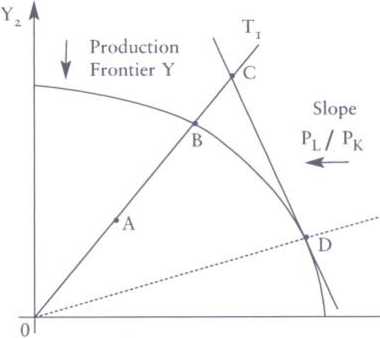Reriew of Islamic Economics, Vol. 8, No. 2.,' 1004
19
transformation of its financial system, to observe Islamic injunctions
in the conducting of business after the year 1989. This has put, as the
authors say, the spotlight on the performance of Islamic banks in
Sudan, and lends significance to their effort. The study employs the
SFA cost frontier approach, decomposing the error term ε into random
noise V and possible inefficiency factor u. The model specifications are
almost flawless.'9
The paper finds that the Islamic banks in Sudan have low X-
efficiency - technical and allocative - they were not optimizing their
input usage. Furthermore, the authors claim that inefficiency is more
in resource allocation than in their technical use. Based on these broad
findings, the study ventures a few policy prescriptions for improving
the performance of Islamic banks in Sudan. This sketch hopefully
does justice to their work.
Figure 3: Output-Oriented Technical and Allocative Efficiency

Efficiency
Measures
TE=OAZOB
RE=OzVOD
AE=RFTTE
=OB∕OD

The effort of the authors is laudable as far as it goes. The
difficulty is that it does not go far enough, nor always stay on course.
It could have been prefaced with the details, even if brief, of the
evolution, expansion, transformation, and ownership or scale
structures of Islamic banks in Sudan. Is it that no foreign banks
operate in the country or interest-based financing is at zero level
More intriguing information
1. The name is absent2. Credit Market Competition and Capital Regulation
3. Non-farm businesses local economic integration level: the case of six Portuguese small and medium-sized Markettowns• - a sector approach
4. The name is absent
5. How much do Educational Outcomes Matter in OECD Countries?
6. On Dictatorship, Economic Development and Stability
7. MICROWORLDS BASED ON LINEAR EQUATION SYSTEMS: A NEW APPROACH TO COMPLEX PROBLEM SOLVING AND EXPERIMENTAL RESULTS
8. Consumer Networks and Firm Reputation: A First Experimental Investigation
9. Luce Irigaray and divine matter
10. The Triangular Relationship between the Commission, NRAs and National Courts Revisited